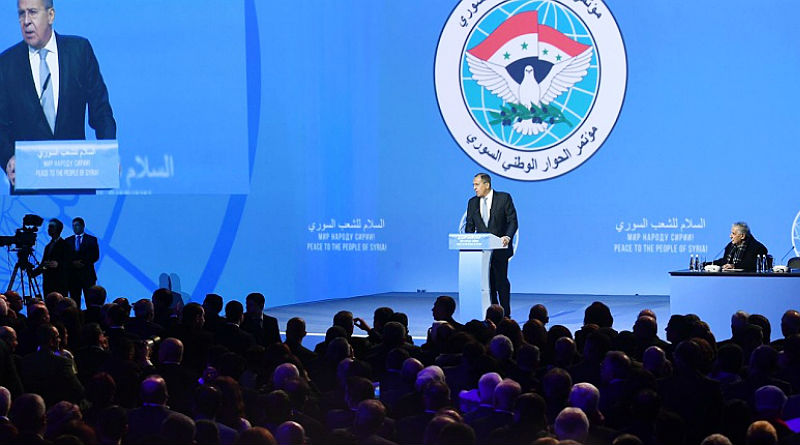The Sochi Congress Under a Magnifying Glass: A Constructive Critique of Russia’s Initiative for a Syrian-Syrian Dialogue
Photo: Sputnik/Mikhail Viskresensky
Рublication source: Valdai Club Foundation, 22.02.2018
Last month, Russia held its long awaited “Syrian National Congress” in the Black Sea resort of Sochi, which pursued the ambitious goal of providing an umbrella platform for a wide spectrum of Syrians – including players not currently participating in the Geneva talks. While the Congress was initially conceptualized as an event to celebrate the victory of the regime and its allies over “terrorism” in Syria, it subsequently morphed into an initiative for launching a constitutional reform exercise.
In the weeks leading up to the Congress, Russia faced an uphill battle in finalising the list of invitees to Sochi, sparring with Turkey over Kurdish representation, while encountering resistance from the Syrian Negotiation Committee (SNC) – all against the backdrop of a deteriorating situation in Idlib and Afrin. Amid boycotts from the SNC, Kurdish groups and armed factions, the Sochi Congress nonetheless started on January 30, gathering approximately 1,500 Syrians, of which only ca. 100 participants were considered anti-Assad oppositionists. The event saw a few hours of closed-door discussions among Syrians, yet ended with the adoption of an agreement that had been “pre-cooked” by Sochi’s three guarantors – Russia, Iran and Turkey – and the UN. According to the agreement, the formation of a Constitutional Committee, including the final decision on its composition and mandate, would be left to the UN Office of the Special Envoy (OSE) and the Geneva process. Importantly, as the OSE seeks to implement that agreement over the coming weeks and months, any unilateral efforts to change its terms would diminish its legitimacy in the eyes of Syrians and the international community.
Russia’s stated goals in Sochi were commendable: it hoped to overcome the deadlocked regime-opposition talks in Geneva by launching a broad-based Syrian-led dialogue. Russia also rightly recognised that suggesting a more limited agenda for talks, centred on the substance of a reformed constitution and the electoral process, while de-emphasising transitional governance, may help breathe new life into a Geneva process that has so far seen zero commitment from the Syrian government. Whatever the flaws of the Sochi Congress – Moscow has opened up the “space” for diplomatic efforts towards broadening the negotiations and achieving a viable political solution. This, however, should be done with greater care for both the process of convening a Syrian-Syrian dialogue, as well as its substance. Specifically, the Russian initiative highlights three lessons:
1. The dangers of rushing into a constitution-drafting exercise
Russia’s insistence on focusing the Sochi Congress on kick-starting a constitutional reform exercise met with opposition resistance and raised fears that the ensuing process might close out – rather than build toward – meaningful political change. Syrians argue that clear sequencing, which allows for an extended timeframe of Syrian-Syrian negotiations towards the adoption of a ‘political agreement’, is a necessary pre-requisite for the drafting of a new constitution. More specifically, such a ‘political agreement’ would address questions of governance, confidence building measures and the distribution or limits of powers, in order to lay stronger foundations for any subsequent constitutional process. Adopting an extended but time-bound period of broadened negotiations, which introduces incremental changes leading to a political transition, will be of greater value than a hastened exercise of drafting a new constitution and then rushing into elections, which the Sochi Congress was widely perceived to champion.
2. The need for inclusiveness
Leaving aside Sochi’s narrow focus on constitutional amendments at the expense of a focus on genuine governance reforms, Russian efforts were also impeded from the outset by allegations that the majority of invitees to its Congress were loyalists attending with the tacit approval of Damascus. As a result, Russia failed to produce inclusive Syrian representation in Sochi, in stark contrast to its stated (and commendable) intention. Indeed, the promotion of both non-opposition and non-government voices to the negotiating table has long been advocated by Syrians as a key prerequisite to breaking the deadlock in the political process. More importantly, allowing a role for Syrians themselves in shaping new mechanisms like a Constitutional Committee is considered vital for ensuring that their outcomes are widely accepted. A selection process led entirely by either the “Sochi guarantors” or the UN will be criticised as not affording sufficient agency to Syrians. Instead, Syrian personalities taking part in our own closed-door dialogue meetings have proposed the idea that an ‘organising committee’ be formed, which would include representatives of the government, opposition and civil society in equal proportion. This ‘organizing committee’ would nominate participants – to be agreed by two-thirds majority or by consensus – and would set a draft agenda for a Syrian-Syrian dialogue, as well as issue invitations for the latter in cooperation with the UN.
3. The indispensability of international guarantees
Finally, the recent Russian experience highlights the central importance of legitimising a Syrian-Syrian dialogue through international support. Although Russia repeatedly drew attention to the UN Special Envoy’s attendance of the Sochi Congress as proof of its international legitimacy, it could not mask the fact that only a few Western capitals sent observers. Notwithstanding their considerable differences, Syrian loyalists, oppositions and independent figures continuously stress that any Syrian-Syrian dialogue is doomed to fail unless the process enjoys resolute and broad international support. That support should take the form of both international supervision and guarantees: the dialogue itself could be facilitated and sponsored by the UN, while P5 members of the Security Council – most critically Russia and the United States – should act as guarantors. Over recent months, Syrians engaged in TSG’s Initiative have presented their ideas for a Syrian-Syrian dialogue to key capitals and actors, including the United States, the United Kingdom, France, Russia and the UN. These new ideas should form the basis for a serious discussion between the Security Council P5 in an effort to move the political process forward.

